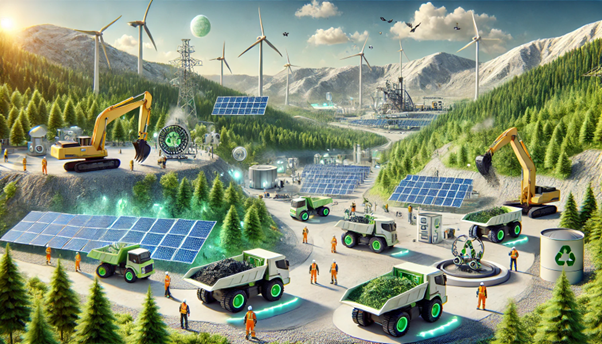The Role of Renewable Energy in Promoting Public Health
/The growing global commitment to renewable energy marks not only an environmental revolution but also a sweeping public health movement. In recent years, the intricate relationship between our energy choices and health has come into sharper focus, revealing that the way we power our world has profound implications for our well-being. This shift from traditional, polluting fossil fuels to clean, sustainable energy sources represents a pivotal change in addressing some of the most pressing health challenges of our time.
Renewable energy, encompassing wind, solar, hydroelectric, and other clean sources, stands at the forefront of this transformation. Its role extends far beyond reducing carbon emissions and combating climate change; it is a catalyst for a myriad of public health benefits. Clean air, reduced noise pollution, economic growth, and the promotion of a healthier lifestyle are just the tip of the iceberg when it comes to the positive impacts of renewable energy on public health.
This article delves deep into the myriad ways in which renewable energy is reshaping our health landscape. From mitigating respiratory diseases and reducing stress levels to enhancing community well-being and fostering economic stability, the switch to renewables is proving to be a vital ingredient for a healthier society. As we navigate through the various dimensions of this relationship, it becomes increasingly clear that the journey towards renewable energy is not just an environmental choice, but a commitment to nurturing healthier, more resilient communities around the globe.
Decreasing Air Pollution: A Breath of Fresh Air
The role of renewable energy in decreasing air pollution is a cornerstone in the intersection of environmental science and public health. This critical relationship underscores the importance of specialized knowledge in these fields. In this context, pursuing an MPH (Master of Public Health) degree, particularly through flexible online programs, becomes highly relevant. MPH degrees online offer the convenience and flexibility needed for professionals to deepen their understanding of environmental health issues without disrupting their current roles. By studying the impact of air quality on health, these programs prepare public health professionals to advocate for and implement renewable energy solutions. This approach to education is crucial for creating a future where clean air is a central component of public health strategy.
Mitigating Climate Change: Protecting Public Health
Climate change, driven largely by fossil fuel emissions, poses a severe threat to public health. Extreme weather events, rising sea levels, and changing disease patterns are just a few of the environmental and health-related consequences. Renewable energy, with its low carbon footprint, stands as a powerful tool for mitigating these effects. By curbing greenhouse gas emissions, renewable sources help stabilize climate patterns, thereby preventing health emergencies related to extreme climatic conditions and safeguarding vulnerable populations from climate-induced health risks.
Economic Benefits: Enhancing Health through Prosperity
The economic benefits of renewable energy also indirectly foster public health. The sector's growth leads to job creation, economic diversification, and increased stability, all of which contribute to better health outcomes. Employment in the renewable sector offers not only financial stability but also reduces the occupational health risks commonly associated with the fossil fuel industry, such as exposure to toxic substances and hazardous working conditions. A thriving renewable energy market thus promotes a healthier, more economically robust society.
Reducing Water Contamination: A Clearer Path to Health
Renewable energy's role in reducing water contamination is another significant public health benefit. Traditional energy production, particularly through coal and oil, often leads to water pollution through runoff, spills, and leaching of toxic materials. In contrast, most forms of renewable energy, particularly wind and solar, have minimal impacts on water resources. This reduction in water contamination safeguards drinking water supplies, protects aquatic ecosystems, and prevents waterborne diseases, thereby securing a foundational element of public health.
Enhancing Psychological Well-being: The Green Calm
Beyond the physical health benefits, renewable energy also contributes to psychological well-being. Living in a cleaner, greener environment has been shown to reduce stress and improve mental health. Renewable energy projects often incorporate green spaces and are associated with reduced noise pollution compared to fossil fuel-based installations. The psychological benefits of a cleaner and quieter environment, along with the knowledge of contributing to a sustainable future, foster a sense of well-being and community health.
Improving Respiratory Health: A Sigh of Relief
Renewable energy's impact on respiratory health cannot be overstated. The pollutants emitted by burning fossil fuels are notorious for causing respiratory issues such as asthma, bronchitis, and lung cancer. By transitioning to cleaner energy sources, the incidence of these diseases can be significantly reduced. Communities living near renewable energy installations benefit from cleaner air, leading to fewer hospital visits, reduced medical costs, and overall improved quality of life. This shift is particularly beneficial for vulnerable groups like children and the elderly, who are more susceptible to respiratory ailments.
Promoting Physical Activity: The Energetic Lifestyle
Renewable energy projects often go hand-in-hand with infrastructure that promotes physical activity. For instance, solar-powered street lights in parks encourage evening sports and walks, while wind farms often coexist with hiking and biking trails. As more communities invest in these public spaces, local groups and schools are inspired to host outdoor sports activities, making gear like track uniforms a common sight. This integration of renewable energy into community spaces not only generates clean power but also encourages a more active, healthier lifestyle among the public.
Reducing Noise Pollution: Sounds of Silence
Another often overlooked benefit of renewable energy is its contribution to reducing noise pollution. Unlike traditional energy sources, renewables like solar and wind power operate relatively quietly. Living in environments with lower noise levels has been linked to reduced stress, better sleep, and overall improved mental health. By lowering the cacophony associated with fossil fuel-based power generation, renewable energy can provide a more tranquil and healthier living environment.
Enhancing Food Security: Nourishing the Future
Renewable energy can also play a role in enhancing food security, which is intrinsically linked to public health. Innovative practices like using solar energy to power agricultural equipment or utilizing wind energy for water irrigation lead to more sustainable food production. This not only ensures a steadier supply of food but also promotes healthier, less pesticide-dependent farming practices, contributing to better nutritional health.
Educating and Empowering Communities: Knowledge is Health
Finally, the renewable energy movement is often accompanied by educational campaigns that empower communities with knowledge about sustainability and health. Understanding the impact of energy choices on health and the environment can lead to more informed decisions, fostering a culture of health-conscious and environmentally responsible citizens. This empowerment through education is a crucial step in achieving a healthier future for all.
Illuminating the Path to a Healthier World
The transition to renewable energy is more than an environmental imperative; it's a public health revolution. From reducing air and noise pollution to fostering economic growth and enhancing community well-being, the health benefits of renewable energy are vast and varied. As we embrace cleaner energy sources, we are not just safeguarding our planet but also paving the way for a healthier, more sustainable future. The interplay between renewable energy and public health underscores the profound impact our energy choices have on our collective well-being. It's a clear message that when we invest in renewable energy, we are investing in the health and prosperity of current and future generations. This journey towards renewable energy is not just a leap towards a greener planet, but a stride towards a healthier humanity.
About the Author:
A leading Internet strategy, marketing, and development company employs Ronald Mccarthy as a senior editor. Ronald is in charge of developing online strategies and marketing initiatives, for which he makes sure that every blog post he creates is EPIC.









































The shift toward clean energy sources is rapidly gaining momentum as society becomes increasingly aware of the impacts of climate change and environmental pollution. This transition is especially important in areas with higher pollution levels, where clean energy offers a pathway to healthier, more sustainable living.